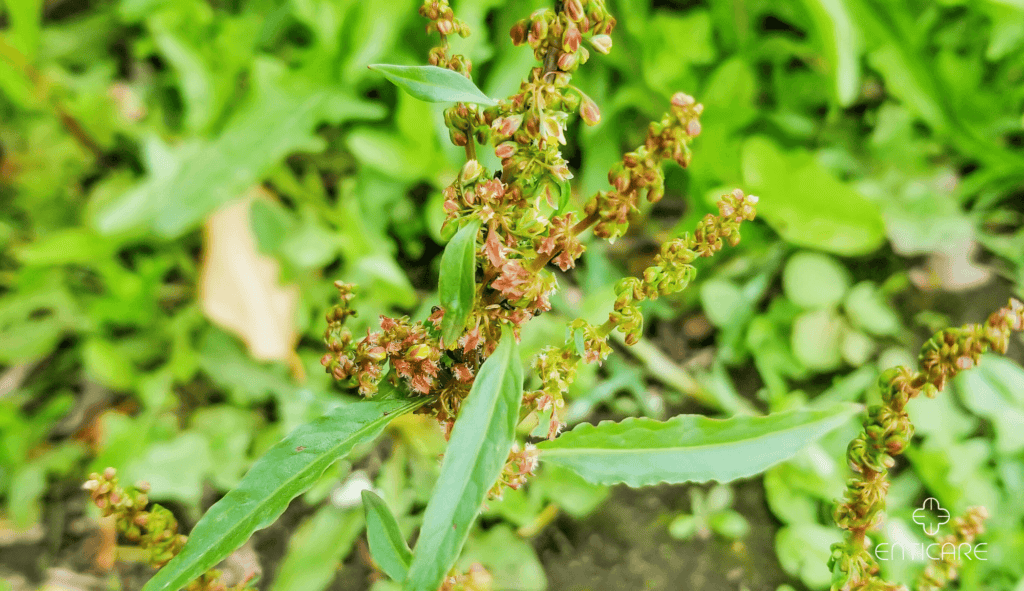Struggling with allergies when the summer sun is shining? You might be surprised to learn the culprit isn’t typical grasses, but a sneaky duo: dock and sorrel. These widespread weeds pack a powerful pollen punch, triggering uncomfortable symptoms in unsuspecting allergy sufferers.
Dock and sorrel, belonging to the Rumex genus, are common throughout North America. Unlike most grasses that pollinate in spring, these stealthy weeds unleash their pollen from late spring to early summer, often overlapping with grass pollen season. This overlap can make pinpointing the exact allergy source tricky.
If you experience allergy symptoms during the late spring and summer months, dock and sorrel could be the culprits. Let’s explore:

Symptoms of a Dock and Sorrel Allergy:
If you experience these symptoms, particularly during late spring and summer, consult an allergist for proper diagnosis:
- Runny or stuffy nose
- Itchy, watery eyes
- Sneezing
- Coughing
- Scratchy throat
- Itchy, irritated skin (hives)
- Worsened asthma symptoms
What Causes a Dock and Sorrel Allergy?
Similar to other allergies, inhaling dock and sorrel pollen triggers your immune system to overreact. It mistakenly identifies the pollen as a harmful invader and releases histamines, chemicals that cause allergy symptoms.
Preventing Dock and Sorrel Allergy Attacks:
Pollen Power: Stay informed! Check daily pollen counts and limit outdoor activities when dock and sorrel pollen levels are high.
Dress for Success: When venturing outdoors, wear long sleeves and pants to create a barrier against pollen.
Shower Away the Pollen: After spending time outside, take a shower and change clothes to remove pollen clinging to you.
Seal the Deal: Keep windows closed during peak pollen seasons and consider using air purifiers with HEPA filters indoors.
Medication Magic: Talk to your doctor about antihistamines or nasal corticosteroids to manage symptoms.

Risk Factors for a Dock and Sorrel Allergy:
Family Matters: Having a family history of allergies increases your risk.
Existing Allergies: Individuals with allergies to ragweed or other weeds are more susceptible.
Environmental Exposure: Frequent exposure to dock and sorrel pollen can heighten your allergy response.
Treatment Options for a Dock and Sorrel Allergy:
Antihistamines: These medications block the action of histamine, reducing allergy symptoms like runny nose, sneezing, and itchy eyes.
Nasal Corticosteroids: Prescription nasal sprays delivered directly to the nose work to reduce inflammation in the nasal passages, alleviating congestion and irritation.
Allergy Shots (Immunotherapy): Over time, allergy shots can desensitize your immune system to dock and sorrel pollen, reducing your reaction over a period of years.
Consulting a board-certified allergist is crucial for a proper diagnosis and an effective treatment plan tailored to your specific needs.

Living With a Dock and Sorrel Allergy
By understanding dock and sorrel allergies and implementing preventative measures, you can significantly reduce their impact on your summer enjoyment. Don’t let allergies hold you back from embracing the sunshine! With proper management and some strategic planning, you can breathe easy and conquer those summer sniffles. Let Enticare guide you to the best treatment options tailored to your needs. Call us at 480-214-9000 for personalized support.

